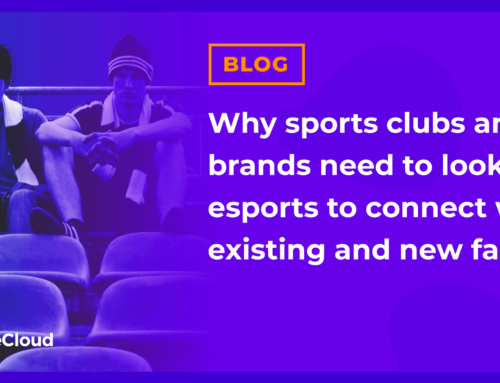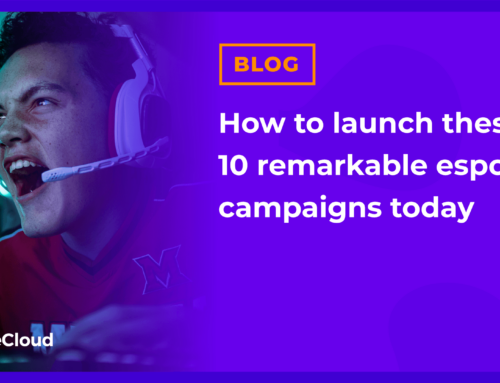Live events are dead.
Time to gain ground in the digital space
Time to gain ground in the digital space
With over a third of the entire world population in some form of lockdown, consumer behavior is shifting towards the digital environment. Brands from all around the world are working hard to adapt and find new ways to connect with their audience during these times.
One heavily impacted industry is the sports world. The postponement of all major sport events such as the Summer Olympics, Football leagues and NBA are leaving sport clubs, athletes and sponsors with lots of uncertainty. On the other hand millions of sports fans miss watching the games and the social aspect that comes with it, such as going out and discussing sports with co-workers and friends.
On the bright side, crisis is also a time for opportunity. Fan engagement hasn’t stopped during this pandemic, it’s just changing. Marketing departments are being creative in finding new ways to build up digital engagement with their audience and keep their communities alive. Some broadcast reruns of classic sports competitions and others like Formula 1 are organizing online Grand Prix series where F1 drivers go head to head in a virtual race.
How are you handling this major change? In this article we challenge you to think out of the box and be proactive in coming up with innovative solutions.
You will dive into:
The impact of Corona on sports events
Due to the Corona-outbreak forcing us into social isolation, almost all sports events are postponed or cancelled across the world. Major events such as The Tokyo Olympic Games 2020 have been postponed until July 2021 and others have followed in their footsteps. The restart dates of significant competitions such as the Premier League are uncertain and constantly under review. Unfortunately, it seems that large public events such as festivals, sports competitions and concerts will be among the last to recover from this crisis.

The impact for everyone in the ecosystem, from athletes and sports clubs to sponsors and fans is devastating. The sports business model has three main income streams. The first being broadcasting of competitions, secondly sponsorships and lastly ticketing and hospitality during matches.
Consulting company KPMG calculated that the cancellation of the five most important football competitions in Europe could cause a loss of around 4 billion euros in revenue. The industry has to find new ways to engage fans in order to capitalize on the spike in media consumption.
Event marketers have to drastically turn directions as they are under great pressure to find new ways to create sponsorship opportunities. The marketing budget is also the first thing organizations drop down to cut costs. But in a world where in-person brand activations are being put to hold, event managers have to pivot into an entirely new way of working
How the sports world is shifting direction
With all sports clubs and organizers having to find new ways to create digital engagement, this pandemic has shown how much the sports business model relies on TV broadcasting and live audiences. Some have been transitioning to a more digital broadcast ecosystem and are seeing exciting results. Others have used the power of gamification to drive explosive digital engagement.
The NFL has made every game since 2009 available for streaming. Mark Tatum, COO of the NBA went even further by stating the league’s strategy to the World Economic Forum:
“We’ve launched an NBA 2K competition (an esports form of the game) with players streaming from their homes. We’re hosting live quarantine parties on social media with current and former players and we’re showing classic games every night. All things to continue to engage our fans during this time.”

In response to the cancellation of real life races NASCAR launched the eNASCAR iRacing Pro Invitational Series, with pro drivers from all around the world racing from simulators in their homes. The series aired on Fox Sports 1 and drew in over 900,000 viewers! The entitlement sponsor of this event is Coca-Cola. The sim-race is the longest running championship featuring 40 racers that compete for a share of $300,000.
Chris Bigda, Director of Sports Marketing Activation for The Coca-Cola Company said:
“eNASCAR presents a unique opportunity for us to engage with consumers through some of the best esports competition that exists today. Through our new position as a NASCAR Premier Partner we’re exploring innovative ways to activate across the sport. This series allows us to connect with race fans, identify new talent and ultimately, celebrate champions with refreshing ice-cold Coca-Cola.”

The Chief Digital Officer at NASCAR continued to say the audience of the eNASCAR platform had been growing strongly in 2019 and is now ready for the momentum coming to the Iracing Series. Esports have grown massively in recent years and already sports leagues across the world are using esports to maintain engagement and a sense of competition during lockdown.
“If you want to be disruptive and engage with your fans, this is a time they are literally sitting around waiting to hear from you.” – Sports communications professional Joe Favorito
Belgian’s largest telecommunications company Proximus is one of the biggest broadcasters of live sports in Belgium, dedicated to growing esports in the region. Following the covid-19 crisis, it decided to partner up with the Belgium Pro League and engage the league’s fans with esports. The two decided to work with StriveCloud as a technology partner.
After joining forces the Proximus Pro League e-Cup was born – an explosive online tournament and community digital arena. The league invites fans to register online where they can represent their favourite Pro League team in a FIFA 20 esports competition, and play online matches against their friends and their idols.

A perfect mixture of behavioral psychology, motivational theory and gamification techniques sparked an engaging fan experience. With 2,000 registrations within the first hours after launch and over 3,000 matches played in just 2 days (this is almost 300 hours of fan engagement!), Proximus and the Belgium Pro League and the Belgium Pro League ultimately succeeded in gaining precious eyeball time during lockdown.
The benefits of digital engagement
Technology is a powerful leverage in every industry. Now that all live events are cancelled, event marketers and sponsors have to find alternative solutions to connect with their audiences. Fortunately, using gamification in marketing activation has proven its worth in retaining digital engagement.
More interaction & connectivity
Believe it or not, online events have a lot more interaction amongst participants than normal events do. 30% of people are more likely to speak to a person in a virtual environment. That’s because virtual events offer tools such as polls, Q&A, live chat and even downloadable resources so your fans can fully engage with your content.
Easy to scale
When you are hosting an event you are always limited to its physical venue. Virtual events make it much easier to scale, so you can host more attendees in a time-effective manner. It might require some set-up time but requires overall less people and can cut costs with over 75%.
Gain more data
Data is power. Online events allow you to measure everything so you can analyze and improve after or even during your event. You can gather in-depth data about the entire digital fan experience as well as the individual participants.
Reach new target demographics
Sports clubs are seeing their audience getting a little bit older every year. Many sports executives fear that it’s because young generations aren’t interested in sports anymore. But that is not true. New generations enjoy sports just as older generations, they just consume it in a different way. For example, the game streaming community is growing fast and heads of BT, ITV and BBC have said they expect it to be on broadcast channels soon. With a global audience of over 134 million people, esports is an attractive channel to connect with these heavy digital consumers.
Gamification for marketing activations: the digital engagement jackpot
Bringing gamification into your marketing activation is when you use all the mechanisms that make a game fun and engaging and use it to inspire participation. Have you ever wondered why games are so popular? Or how they create such vivid fandoms and keep players engaged for hours? Well, video game makers expertly craft experiences to fulfil our basic psychological needs. That’s why they are so engaging.
A gamified experience leverages a combination of both intrinsic and extrinsic motivational drivers. Intrinsic motivation is when an activity in itself is an enjoyable experience whilst extrinsic motivation are the triggers that push the process forward. It’s a jackpot for digital engagement if you know an average gamer spends around 6 hours a week gaming, and some even up to 20 hours plus.
Gamification techniques
What truly puts the experience in place is the use of gamification techniques. Gamification is the use of game-like mechanisms to inspire active participation in the experience, by making it fun and engaging.
Don’t miss out on opportunity!
As former United States president John F. Kennedy once stated during times of crisis: the Chinese notation of the word ‘crisis’ is composed of two characters being danger and opportunity. Nobody saw this coming, but those who are ready to innovate can imagine no better time than now.

With esports having been on the rise, with a projection to grow even further this is the moment to gain a new type of awareness. As competitive gaming is becoming a part of the mainstream popular culture, global investors and brands are all paying attention to the over 454 million viewers. Large part of this growth is thanks to the social component of live streaming and gaming. Platforms such as Twitch and YouTube allow gaming fans a direct connection to the players and teams.
Too long, didn’t read? Here’s what you missed:
The impact of COVID-19 on all live events is disastrous. Major sport events like the Olympic Games are impacted widely and postponed due to 2021. Others are evaluating regularly on when they will be able to restart and what precautions will be needed.
Sport organisations are shifting gears swiftly by moving fan engagement online. Athletes are turning into gamers and sponsors are pivoting into esports for marketing activation.
We live a historical moment, that opens up new opportunities as the esports market is rapidly growing, sports organizations might hop on the trend, discover new revenue streams and tap into new audiences.
All eyes are on digital. The question is: are you?



